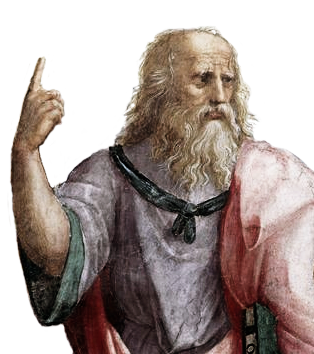
Form of the Good
The Form of the Good, or more literally translated "the Idea of the Good" (ἡ τοῦ ἀγαθοῦ ἰδέα[a]), is a concept in the philosophy of Plato. In Plato's Theory of Forms, in which Forms are defined as perfect, eternal, and changeless concepts existing outside space and time, the Form of the Good is the mysterious highest Form and the source of all the other Forms. It is a Platonic ideal.
"The Good" redirects here. For other uses, see Good (disambiguation).Uses in The Republic[edit]
The first references that are seen in The Republic to the Form of the Good are within the conversation between Glaucon and Socrates (454 c–d). When he is trying to answer such difficult questions pertaining to the definition of justice, Plato identifies that we should not "introduce every form of difference and sameness in nature" instead we must focus on "the one form of sameness and difference that was relevant to the particular ways of life themselves" which is the form of the Good. This form is the basis for understanding all other forms; it is what allows us to understand everything else. Through the conversation between Socrates and Glaucon (508 a–c), Plato analogizes the form of the Good with the sun as it is what allows us to see things. Here, Plato describes how the sun allows for sight. But he makes a very important distinction, "sun is not sight" but it is "the cause of sight itself." As the sun is in the visible realm, the form of Good is in the intelligible realm. It is "what gives truth to the things known and the power to know to the knower". It is not only the "cause of knowledge and truth, it is also an object of knowledge".
Plato identifies how the form of the Good allows for the cognizance to understand such difficult concepts as justice. He identifies knowledge and truth as important, but through Socrates (508d–e) says, "good is yet more prized". He then proceeds to explain "although the good is not being" it is "superior to it in rank and power", it is what "provides for knowledge and truth" (508e).[1]
Influence[edit]
Plato's writings on the meaning of virtue and justice permeate through the Western philosophical tradition.[8] Plotinus, the founder of neoplatonism, had principles that were heavily influenced by the Good. His concept of 'the One' is equivalent to 'the Good' because it describes an ultimate ontological truth. 'The One' is both 'uncaused' and the cause of being for everything else in the universe. Plotinus compared his principle of 'the One' to an illuminating light, as Plato did with the Form of the Good. As a result of Plotinus' school of neoplatonism, the bulk of understanding of Platonic philosophy until the 19th century came through Plotinus' interpretation of it. Many theologians and philosophers of Judaism, Christianity and Islam looked to the ideas of Platonism through the lens of Plotinus.[9]
Amphis, a comic playwright of Athens, has one of his characters say: "And as for the good that you are likely to get on her account, I know no more about it, master, than I do of the good of Plato."[10] There is an ancient anecdotal tradition that Plato gave a public lecture entitled "On the Good" which so confused the audience that most walked out. At the end of the lecture Plato said to those hearers who remained: 'The Good is the One".[11]